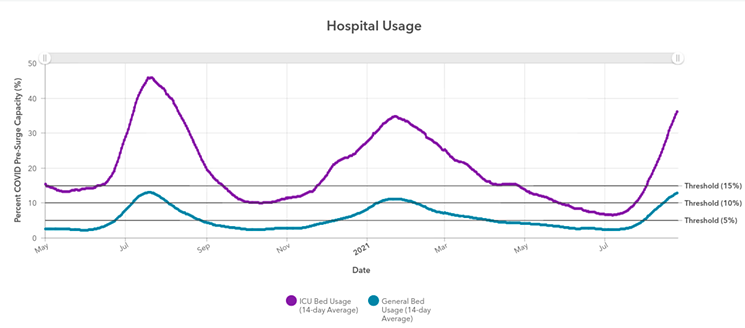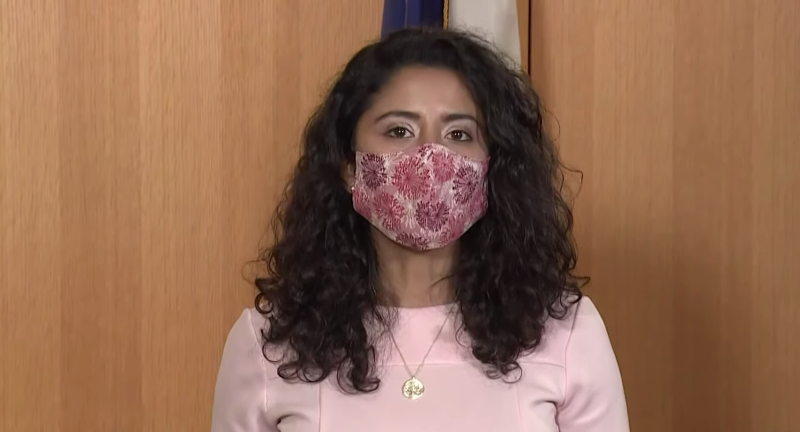But both Harris County and the city of Houston have given encouraging updates that their recent decisions to straight-up pay people to be vaccinated have already led way more community members to opt to receive one of the three available coronavirus vaccines, hoping the increases will help slow Delta's rapid spread.
Harris County Judge Lina Hidalgo is delighted at how successful the county’s recently-implemented $100 debit card incentive program for folks who get their first vaccine shot from the county’s public health department has been. In a tweet Thursday afternoon, Hidalgo announced that since the program was implemented on August 17, the county has seen a 706 percent increase in inoculations since before the county offered the first-shot incentive.
Harris County is so excited about the massive impact its new incentive has had that Harris County Public Health announced Thursday the $100 incentive is now available for any county resident who gets a first vaccine dose anywhere in Harris County between August 26 and 31, not just from county-affiliated vaccine providers.Unbelievable. Over 3,400 people received a COVID-19 first dose with Harris County Public Health on Tuesday alone - a 706% increase compared to before our $100 incentive program. Let’s keep rolling, Harris County. Our nurses are being pushed to the limit - let’s have their back. pic.twitter.com/DlxOBTyQBQ
— Lina Hidalgo (@LinaHidalgoTX) August 26, 2021
Any Harris County residents who gets their first doses within that time frame from a non-county vaccine site simply need to fill out a short online form so that the county can verify their address and vaccination information through the state’s electronic vaccine database.
“If a resident who completes the online form and meets the qualifications for the $100 virtual cash card, HCPH will provide a notice to the individual through text message or email notification,” Harris County Public Health wrote in a Thursday press release announcing the change. “HCPH’s verification process will take 7-14 days depending on volume. The cash card should arrive via text message or email 1-3 business days upon approval notification,” the release continued.
The Houston Public Health Department’s recently-unveiled $150 incentive program is also off to a great start according to data provided by the city. Announced on Wednesday, the city’s new program offers $100 gift cards for first doses and $50 card for second doses as long as city residents receive their shots from certain health department-affiliated vaccination sites.
In a statement Thursday night, the Houston Health Department revealed that COVID-19 vaccinations “increased more than five-fold” after the program was implemented.
“A total of 740 doses were administered on Thursday at the department’s eligible health centers and multi-service centers,” the city health department’s statement continued, representing “a 512% increase over Wednesday’s total of 121 doses.”

In a much more somber update, the city health department also announced hours later that it had confirmed the city’s first COVID-19 pediatric death in a child without any underlying health conditions.
Citing health care privacy laws, the city only said the child who died due to complications from the coronavirus was “A Houston boy between the ages of 10 and 19,” and that the child was “unvaccinated for COVID-19, was white and died in late July at a Houston hospital.” The Houston Health Department also confirmed “six previous pediatric deaths” within the city during the pandemic; all of those children “had underlying health conditions.”
“On behalf of the City of Houston, I extend my condolences to the boy’s family during their time of grief,” said Houston Mayor Sylvester Turner in a statement. “The death of a loved one under any circumstance is heartbreaking, especially when we have the power to slow the spread and save lives. I encourage all eligible Houstonians ages 12 and older to get vaccinated and wear a face mask in large crowds or areas where you cannot socially distance.”
The city’s Chief Medical Officer Dr. David Persse said “This tragedy serves as a reminder that children, even without underlying health conditions, can get seriously ill and die from COVID-19," especially given the rapid spread of the Delta variant.
With Delta still surging and more research available that shows the protection offered by COVID-19 vaccines begins to wane between 6-8 months, the U.S. Centers for Disease Control announced earlier this month that it is recommending additional vaccine doses for individuals who took either the Pfizer or Moderna vaccine. The CDC said all U.S. adults will be eligible to get a third “booster shot” starting on September 20, and is recommending everyone 18 and up who got either Pfizer or Moderna’s two-shot vaccine regimen take their extra shot eight months after receiving their second shot.
In a newsletter to Houston Methodist patients, Dr. H. Dirk Sostman, Houston Methodist’s chief academic officer, answered several common questions the hospital chain has received about third shots and booster shots of COVID-19 vaccines, which are apparently not the same thing, and about whether people can safely mix doses of Pfizer and Moderna’s vaccines when getting their additional shots.
Sostman explained that the U.S. Food and Drug Administration has expanded its emergency use authorization of both Pfizer and Moderna’s highly-similar two-shot COVID-19 vaccines (both of which use mRNA technology) to allow folks with weakened immune systems due to ongoing medical conditions “to receive a third dose without a prescription” effective immediately.
“For third shots, the FDA recommends that attempts be made to match your third dose to the original mRNA vaccine you received,” said Sostman. “However, this may not always be feasible. If this is the case, an additional dose of a different mRNA vaccine is permitted,” and should be administered no sooner than 28 days after the immunocompromised person has received their second dose.
“For third shots, the FDA recommends that attempts be made to match your third dose to the original mRNA vaccine you received. However, this may not always be feasible. If this is the case, an additional dose of a different mRNA vaccine is permitted.” - Dr. H. Dirk Sostman, chief academic officer at Houston Methodist Hospital
tweet this
As for booster shots once those are approved for use in the general population, “the Houston Methodist Vaccine Scientific Committee recommends they match the original vaccine. However, if your primary vaccine series was Moderna, a third dose of Pfizer is acceptable,” Sostman wrote.
For those wondering about how Johnson & Johnson’s one-shot vaccine plays into all of this, Sostman wrote that “At the present time, the FDA does not have sufficient data to support the use of an additional mRNA COVID-19 vaccine dose after a primary Johnson & Johnson COVID-19 vaccine in immunocompromised people,” he wrote, explaining that “the FDA and CDC are actively working to provide guidance on this issue.”
Johnson & Johnson representatives said Wednesday that a study has shown second shots of its COVID-19 vaccine did indeed increase the immune response against the deadly virus in study participants. While Pfizer’s vaccine is the only vaccine to receive full-on FDA approval, both Moderna and Johnson & Johnson are in the process of seeking full approval for their vaccines.
Even given the CDC’s recent recommendation that booster shots for all Americans start rolling out in late September, all three vaccine manufacturers are currently awaiting final approval from the FDA and the CDC’s vaccine advisory committee that will set the federal government’s booster shot policy in stone.


